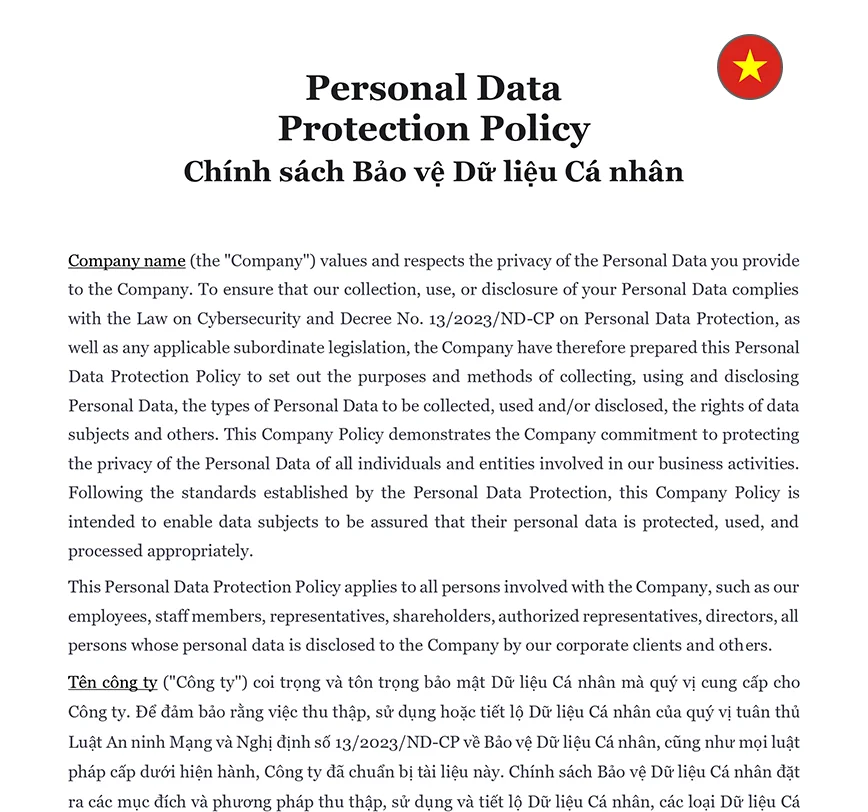Ready to use legal template
Drafted by experienced lawyers
Vietnamese-English translation
Ready to use legal template
Drafted by lawyers
Vietnamese-English translation
Home › Intellectual property › Personal data protection
Learn more about Personal Data Protection in Vietnam
Personal Data Protection encompasses the array of measures and regulations aimed at preserving the confidentiality, integrity, and availability of individuals’ personal information, shielding it from unauthorized access, use, or disclosure. Our Personal Data Protection documents are professionally drafted by our seasoned legal experts to align seamlessly with the nuanced requirements of Vietnamese law. Designed with precision and clarity, our templates are presented in an easy-to-edit Word format, empowering you to navigate the complexities of personal data protection with confidence and assurance.
Table of contents
What is Personal Data Protection?
What is included in Personal Data Protection?
Why is Personal Data Protection important?
What are the laws about Personal Data Protection in Vietnam?
What are the rights and responsibilities under Personal Data Protection?
What are the penalties for non-compliance with laws in Vietnam?
Are there industry-specific data protection rules in Vietnam?
How does Vietnam’s data protection framework compare internationally?
What is Personal Data Protection?
Personal Data Protection is the comprehensive set of measures designed to safeguard individuals’ personal information from unauthorized access, use, or disclosure. It encompasses a range of practices and regulations aimed at ensuring the confidentiality, integrity, and security of personal data, thereby preserving individuals’ privacy rights in an increasingly digitized world. By implementing robust data protection measures, organizations and governments seek to mitigate the risks associated with data breaches, identity theft, and misuse of personal information, fostering trust and confidence among individuals and stakeholders.
In today’s interconnected society, Personal Data Protection has become a critical aspect of both legal and ethical considerations. With the proliferation of digital technologies and the widespread collection and processing of personal data, there is a growing awareness of the need to establish clear guidelines and regulations to govern its handling. From data encryption and access controls to consent mechanisms and breach notification requirements, Personal Data Protection frameworks aim to strike a balance between facilitating legitimate uses of data while respecting individuals’ rights to privacy and autonomy.
What is included in Personal Data Protection?
Personal Data Protection encompasses a wide range of measures and practices aimed at safeguarding individuals’ personal information. This includes:
Data Collection: Establishing transparent and lawful methods for collecting personal data and ensuring individuals are aware of the purpose of data collection.
Data Processing: Implementing secure processes for storing, accessing, and managing personal data, including encryption, access controls, and data minimization techniques.
Consent Mechanisms: Obtaining explicit consent from individuals before collecting, processing, or sharing their personal data, and providing options for individuals to revoke consent.
Data Security: Implementing robust security measures to protect personal data from unauthorized access, use, or disclosure, including encryption, firewalls, and secure authentication methods.
Data Retention: Establishing guidelines for the retention and disposal of personal data, ensuring data is retained only for as long as necessary and securely disposed of when no longer needed.
Data Sharing: Limiting the sharing of personal data to authorized parties and implementing contracts or agreements to ensure third parties adhere to data protection standards.
Data Breach Response: Developing procedures for detecting, assessing, and responding to data breaches in a timely manner, including notifying affected individuals and relevant authorities.
Individual Rights: Upholding individuals’ rights to access, correct, or delete their personal data, and providing mechanisms for individuals to exercise these rights.
Accountability: Implementing measures to ensure compliance with data protection regulations, including appointing data protection officers, conducting regular audits, and providing training to staff.
Why is Personal Data Protection important?
Personal Data Protection is crucial for several reasons:
| ➤ Privacy Preservation: It safeguards individuals' right to privacy by regulating how their personal information is collected, processed, stored, and shared. This is essential for maintaining trust between individuals and organizations. |
| ➤ Prevention of Misuse: Without proper protection, personal data can be misused for various malicious purposes, such as identity theft, fraud, or unauthorized access to sensitive information. |
| ➤ Legal Compliance: Many jurisdictions have enacted laws and regulations that require organizations to protect personal data. Compliance with these laws not only avoids legal penalties but also fosters a culture of ethical business practices. |
| ➤ Maintaining Reputation: Data breaches or mishandling of personal data can severely damage an organization's reputation and erode customer trust. Proper data protection measures demonstrate a commitment to responsible data handling, enhancing the organization's reputation. |
| ➤ Protection against Cyber Threats: In an era of increasing cyber threats, personal data protection measures help defend against hacking, data breaches, and other cybercrimes, thereby safeguarding both individuals and organizations from financial and reputational harm. |




